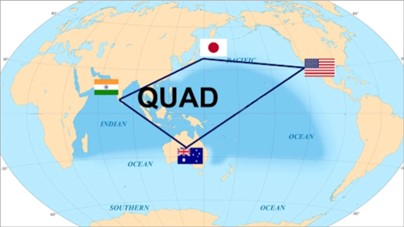-
Q. Assess the significance of the QUAD grouping in the Indo-Pacific region and analyze its implications for regional security, focusing on India's strategic interests and the evolving geopolitical landscape. (250 words)
07 May, 2024 GS Paper 2 International RelationsApproach
- Start the answer with introducing the QUAD grouping.
- Mention significance of QUAD on Regional Security and India's Strategic Interests.
- Delve into key challenges in QUAD amidst evolving geopolitical landscape
- Conclude suitably.
Introduction
The Quadrilateral Security Dialogue or QUAD grouping, comprising India, the United States, Japan, and Australia, has emerged as a significant strategic partnership in the Indo-Pacific region, with far-reaching implications for regional security, geopolitics, and India's strategic interests.
Body
Significance of QUAD:
- On Regional Security:
- Countering China's Assertiveness: The QUAD allows the countries to have a collective bargaining power on issues like the South China Sea disputes, counterbalancing China's influence.
- Cooperative Security Architecture: The QUAD promotes a cooperative approach to security challenges.
- Joint naval exercises like Malabar Exercise 2024 projects a united front for a free and open Indo-Pacific, deterring unilateral actions.
- Shared Values and Norms: The QUAD emphasizes adherence to UNCLOS, freedom of navigation, and peaceful resolution of disputes.
- This normative framework aims to uphold a rules-based order in Indo-pacific.
- On India's Strategic Interests:
- Hedging Strategy Against China: China's increasing naval presence and establishment of military bases in the Indian Ocean such as in Djibouti, has raised concerns for India's maritime security and freedom of navigation in its strategic backyard.
- The QUAD provides India with a strategic hedge against China's rise.
- Securing Unimpeded Trade: The QUAD provides a platform for India to collaborate with like-minded partners to ensure its primary maritime interest of unimpeded trade and energy flows through critical sea lanes like the Strait of Malacca and the Strait of Hormuz.
- Hedging Strategy Against China: China's increasing naval presence and establishment of military bases in the Indian Ocean such as in Djibouti, has raised concerns for India's maritime security and freedom of navigation in its strategic backyard.
QUAD in Evolving Geopolitical Landscape:
- Potential Arms Race: The QUAD's efforts to counter China's assertiveness could prompt increased military expenditure and modernization efforts by both sides, fueling an arms race.
- China already has a perception of the QUAD as an "Asian NATO".
- Lack of Formal Structure: QUAD lacks a formal alliance structure. This ambiguity creates uncertainty about the level of commitment each member is willing to make in a crisis.
- Diplomatic Entanglement for India: Maintaining a balance between leveraging the QUAD for strategic interests and preserving stable relations with China through other multilateral forums like BRICS and SCO is a significant challenge for India.
- The Taiwan Dilemma: The QUAD's stance on Taiwan's status is a potential flashpoint. A unified approach is difficult considering the varying degrees of diplomatic recognition each member accords to Taiwan.
Conclusion
Given the evolving geopolitical dynamics surrounding the QUAD, India must strike a delicate balance between leveraging the QUAD to safeguard its strategic interests and maintaining stable relations with China through diplomatic channels. Strengthening its comprehensive national power, including economic, technological, and military capabilities, will enhance India's strategic autonomy and bargaining power in navigating the complex geopolitical dynamics of the Indo-Pacific region.
To get PDF version, Please click on "Print PDF" button.
Print PDF





